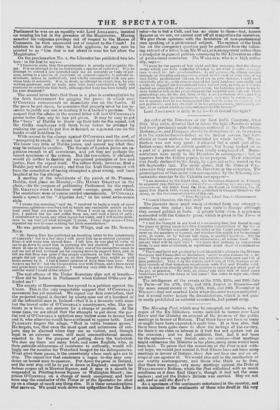An order of the Directors of the East India Company,
dated 28th May 1828, directed that in future the field als,owances which. had been previously made to officers cantoned at the Presidency, Berhampore, and Dinapore, should be discontinued ; or, to express. it in the semi-barbarous dialect of the Indian service, half biota should at those stations be substituted ihr whole batta. The re- duction was not very great ; it affected but a small part of the Indian army, when in certain quarters ; but being looked on as a part of a general system, it was loudly complained of. Repre- sentations were made to the Directors in consequence ; but, as appears from the Indian papers, to no purpose. Their resolution was finally declared to the Army, by a general order issued on the 6th September last. The order states, that the Duke of WEL- LINGTON fully concurred with the Directors in the reduction. The promulgation of this order was accompanied by the following cha- racteristic circular to the Calcutta newspapers- " I am directed by the Right Hon. the Governor-General in Council, to acquaint you, that you are prohibited from admittin_ iris your paper any comments on the letter from the Hon. the Court of Directors, No. 37, dated 31st March 1830, which will be published in General Orders to the Army, in the Government Gazette of this day.
" Gate. SWINTON, Chief Sec. to Government. " Council Chamber, 6th Sept. 1830."
The journals have most wisely abstained from any attempt to
contravene this order : but they can write to Europe although. they cannot publish in India. A private letter from a gentleman connected with the Calcutta press, which is given in the Times of yesterday, says- " I had the thought in my head of a mourning-line, but feared to ruin the paper by giving room to a Star-Chamber construction of the law of comment. Whether comment on the letter of the Court precludes com- ment on the mandate of Council, and whether this might not be mourned over, in words, or by tokens and signs, is another question. But the Star-Chamber is accuser, judge, and executioner, all within itself. Who can say what will be their view ? We know that nothing so exasperates them, or any men so situated, as significant dumb show of resistance or sauciness.
"The Court:have not profited by Lord Mansfield's advice to the Military
Governor and Chancellor of Barbadoes, ' never to give reasons for a de- cree.' Their reasons are sophistical and worthless—dishonest and full of false pretences. They deny the mutiny and treaty of 1795, because no of- ficial records of that notorious negotiation with Pitt and Dundas exist. They do not even directly pledge themselves to respect any other part of the pay or pension. ' Sic volo, sic jubeo,' and they talk of their many bounteous acts to the Army of late years ? The Army in reply ask, where are they ? "
The intelligence of the events of the 27th, 28th, and 29th July
in Paris—of the 27th, 28th, and 291h August in Brussels—and the more recent events of the 27th, 28th, and 29th November in Warsaw—had not reached India when theorder was promulgated ; but it would arrive before the dissatisfaction, which is not quite so easily prohibited as editorial comments, ,had passed away.


























 Previous page
Previous page